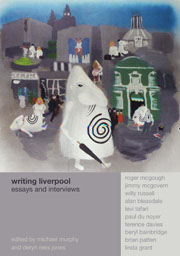Book contents
- Frontmatter
- Contents
- Acknowledgements
- List of Contributors
- Dedication
- Introduction: Sounding Liverpool
- 1 George Garrett, Merseyside Labour and the Influence of the United States
- 2 ‘No Struggle but the Home’: James Hanley's The Furys
- 3 Paradise Street Blues: Malcolm Lowry's Liverpool
- 4 ‘Unhomely Moments’: The Fictions of Beryl Bainbridge
- 5 A Man from Elsewhere: The Liminal Presence of Liverpool in the Fiction of J.G. Farrell
- 6 The Figure in the Carpet: An Interview with Terence Davies
- 7 ‘Every Time a Thing Is Possessed, It Vanishes’: The Poetry of Brian Patten
- 8 Finding a Rhyme for Alphabet Soup: An Interview with Roger McGough
- 9 Rewriting the Narrative: Liverpool Women Writers
- 10 Jumping Off: An Interview with Linda Grant
- 11 Ramsey Campbell's Haunted Liverpool
- 12 ‘We Are a City That Just Likes to Talk’: An Interview with Alan Bleasdale
- 13 ‘Culture Is Ordinary’: The Legacy of the Scottie Road and Liverpool 8 Writers
- 14 ‘I've Got a Theory about Scousers’: Jimmy McGovern and Lynda La Plante
- 15 Manners, Mores and Musicality: An Interview with Willy Russell
- 16 Subversive Dreamers: Liverpool Songwriting from the Beatles to the Zutons
- 17 Putting Down Roots: An Interview with Levi Tafari
- 18 ‘Out of Transformations’: Liverpool Poetry in the Twenty-first Century
12 - ‘We Are a City That Just Likes to Talk’: An Interview with Alan Bleasdale
- Frontmatter
- Contents
- Acknowledgements
- List of Contributors
- Dedication
- Introduction: Sounding Liverpool
- 1 George Garrett, Merseyside Labour and the Influence of the United States
- 2 ‘No Struggle but the Home’: James Hanley's The Furys
- 3 Paradise Street Blues: Malcolm Lowry's Liverpool
- 4 ‘Unhomely Moments’: The Fictions of Beryl Bainbridge
- 5 A Man from Elsewhere: The Liminal Presence of Liverpool in the Fiction of J.G. Farrell
- 6 The Figure in the Carpet: An Interview with Terence Davies
- 7 ‘Every Time a Thing Is Possessed, It Vanishes’: The Poetry of Brian Patten
- 8 Finding a Rhyme for Alphabet Soup: An Interview with Roger McGough
- 9 Rewriting the Narrative: Liverpool Women Writers
- 10 Jumping Off: An Interview with Linda Grant
- 11 Ramsey Campbell's Haunted Liverpool
- 12 ‘We Are a City That Just Likes to Talk’: An Interview with Alan Bleasdale
- 13 ‘Culture Is Ordinary’: The Legacy of the Scottie Road and Liverpool 8 Writers
- 14 ‘I've Got a Theory about Scousers’: Jimmy McGovern and Lynda La Plante
- 15 Manners, Mores and Musicality: An Interview with Willy Russell
- 16 Subversive Dreamers: Liverpool Songwriting from the Beatles to the Zutons
- 17 Putting Down Roots: An Interview with Levi Tafari
- 18 ‘Out of Transformations’: Liverpool Poetry in the Twenty-first Century
Summary
Voted the city's most popular writer by a readers' poll conducted by Liverpool City Libraries in 2003, Bleasdale's dramas, alongside those of his contemporaries Willy Russell and Jimmy McGovern, epitomize for many people the essence of ‘Liverpool style’. Throughout a career spanning over thirty years, Bleasdale has written fifteen stage plays, fourteen works for television, a film and two novels, but it is for the memorable characters in television dramas, such as Boys from the Blackstuff and GBH, that he is most well known. Considered by many critics his finest work, these ‘state of the nation’ dramas situated Bleasdale amongst the foremost political dramatists of his generation. Bleasdale's work is characterized by the depth and complexity of his male characters: anxious, tormented individuals often coping with the entrapment, despair and madness created by unemployment in the 1980s and the shift in gender roles that accompanied changing patterns of employment in the 1990s. As the 1990s progressed, Bleasdale expanded his repertoire, moving away from political dramas and exploring such genres as the crime thriller and classic novel adaptation. With the release on DVD in July 2006 of his work for Channel Four, GBH, Jake's Progress and Melissa, he was in a contemplative mood and agreed to discuss the relationship of his background to his work and the question of whether there is something that could be called a unique Liverpool style.
- Type
- Chapter
- Information
- Writing LiverpoolEssays and Interviews, pp. 184 - 193Publisher: Liverpool University PressPrint publication year: 2007



